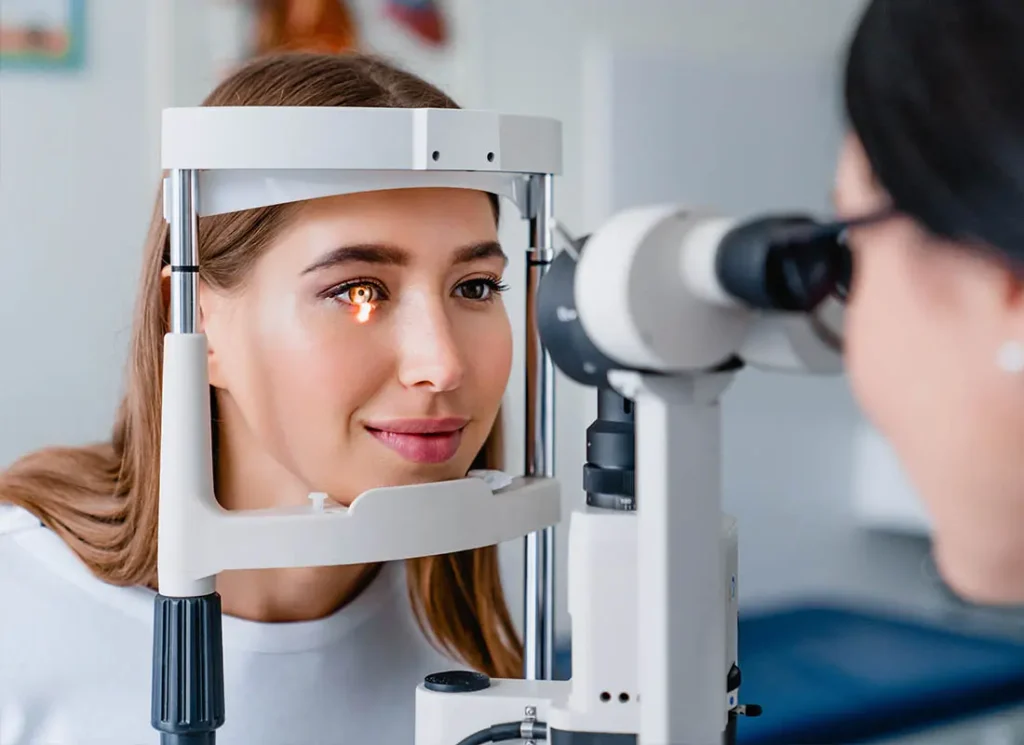Regular eye exams are a key component of preventive healthcare. These exams do more than check your eyesight; they contribute to detecting, managing, and preventing various eye-related conditions. Here are the key benefits of routine eye exams and why they are fundamental to preserving vision health:
Early Detection of Eye Diseases
One of the most fundamental benefits of an eye exam is the early detection of eye diseases like glaucoma, macular degeneration, and diabetic retinopathy. These conditions often develop without noticeable symptoms in their early stages. This makes screening an effective tool to identify them before they progress further. Regular eye health assessments give individuals a better chance of receiving timely treatment and avoiding complications.
Eye exams can also detect signs of systemic health issues, such as high blood pressure and diabetes. Optometrists can identify underlying health issues through eye appearance and function changes. For instance, blurred vision may indicate diabetes, while redness or irritation may signal allergies or infections. Early detection of such conditions allows for timely treatment and management, reducing potential harm to other parts of the body.
Accurate Prescription Updates
Maintaining an accurate prescription is key to promoting optimal vision for those who wear glasses or contact lenses. Changes in eyesight can occur over time due to factors like aging, digital eye strain, or underlying conditions. Regular eye checks allow optometrists to update prescriptions based on current vision requirements and to recommend corrective lenses tailored to individual needs. Outdated prescriptions can contribute to eye strain, blurred vision, and headaches. Routine assessments help fine-tune corrective solutions, promoting optimal visual clarity and comfort in everyday activities.
Prevention of Vision Loss
Many individuals only contemplate vision loss when it starts to affect daily life. Routine eye exams may prevent vision loss. An optometrist can recommend interventions that preserve eyesight by identifying issues like cataracts or retinal detachment in their early stages. For instance, regular eye checks may detect cataracts in their early stages. Early detection enables timely surgery, resulting in restored vision. Similarly, treating risk factors for retinal detachment, such as high myopia or a history of eye injury, can prevent severe outcomes.
Monitoring and Managing Eye Conditions
Consistent checkups are fundamental for individuals with existing eye conditions or chronic diseases affecting vision. Conditions like astigmatism, keratoconus, or dry eye syndrome require ongoing monitoring to manage symptoms effectively. Those with diabetes need regular exams to monitor diabetic retinopathy, which may cause permanent damage if left unchecked.
Eye checks also allow professionals to evaluate the effectiveness of current treatments, including medications or vision therapy. Adjustments made during these visits make sure that patients receive care tailored to their evolving needs. Routine exams also allow patients to discuss concerns or questions about their eye health or overall well-being. Eye care professionals can offer advice on protecting one’s eyes from blue light exposure, maintaining healthy contact lens habits, or addressing any other specific needs.
Book Your Eye Exam Today
Routine eye exams offer significant advantages, from early disease detection to long-term vision management. Protecting your vision health is a proactive step toward enhancing overall well-being. Schedule an appointment with a qualified eye care specialist for expert support and guidance.
- Choosing the Right Plastic Surgeon for Your Cosmetic Procedure
- Understanding Different Types of Laser Treatments for Skin Rejuvenation
- Why a Family Dentist is Key for Maintaining Oral Health
- The Benefits of Regular Visits to a Wellness Spa
- Exploring the Emotional and Psychological Triggers of Eating Disorders


Leave a Reply